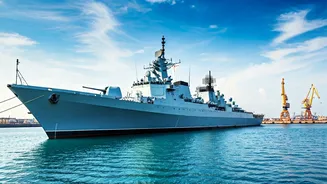Maritime Sector’s Role
Prime Minister Modi has placed a strong emphasis on the maritime sector, recognizing its pivotal role in India's strategic and economic landscape. The
government views shipbuilding not just as an industrial endeavor, but as a critical element for securing India's interests in the Indian Ocean region and beyond. By boosting domestic shipbuilding, India aims to reduce its reliance on foreign entities for essential naval and commercial vessels. The development of a robust shipbuilding industry is expected to stimulate job creation, encourage technological advancement, and attract foreign investment, thereby contributing significantly to the nation's economic progress. This push underscores a comprehensive strategy to fortify India's position as a leading maritime power, enhancing both its defense capabilities and its economic footprint on the global stage. This sector plays a crucial role in international trade and national security.
Strategic Importance Unveiled
The government's focus on shipbuilding has significant strategic implications. A strong domestic shipbuilding capacity is essential for maintaining a modern and well-equipped naval force, capable of protecting India's maritime boundaries and projecting power in the region. This initiative supports the 'Make in India' initiative, boosting the indigenous manufacturing of defense equipment. Furthermore, a thriving shipbuilding sector can facilitate the growth of related industries, such as steel, engineering, and electronics, creating a ripple effect of economic benefits. By investing in shipbuilding, India is enhancing its capacity to respond to potential threats and safeguard its maritime interests. This sector is vital for safeguarding vital sea lanes, conducting humanitarian missions, and ensuring regional stability, solidifying India’s standing in the international community.
Economic Benefits Outlined
The push for shipbuilding promises considerable economic advantages for India. Increased activity in shipbuilding can generate numerous employment opportunities across various skill levels, ranging from skilled engineers and technicians to semi-skilled laborers. This expansion will also foster innovation and technological advancements in the engineering and manufacturing sectors. A robust shipbuilding industry can attract significant foreign investment, further boosting economic growth. Moreover, by reducing dependence on imported ships, India can save foreign exchange and enhance its balance of payments. Increased shipbuilding activity can bolster ancillary industries, improving supply chains and creating a more diversified and resilient economy. The development of a world-class shipbuilding infrastructure can position India as a key player in the global maritime market.
Future Prospects Analyzed
Looking ahead, the Indian government's commitment to shipbuilding suggests a bright future for the sector. Increased investment in infrastructure, training, and technology will be crucial for sustained growth. Collaborations with international partners can facilitate knowledge transfer and technological advancements, enhancing India's competitiveness in the global market. Furthermore, streamlined regulatory processes and incentives for private sector participation can drive investment and innovation. The government's vision of India as a maritime superpower is poised to reshape the economic and strategic landscape. Continuous policy support, coupled with industry collaboration, will be vital in realizing these ambitious goals. India’s strategic location and expanding economy make it an attractive location for maritime ventures.






















